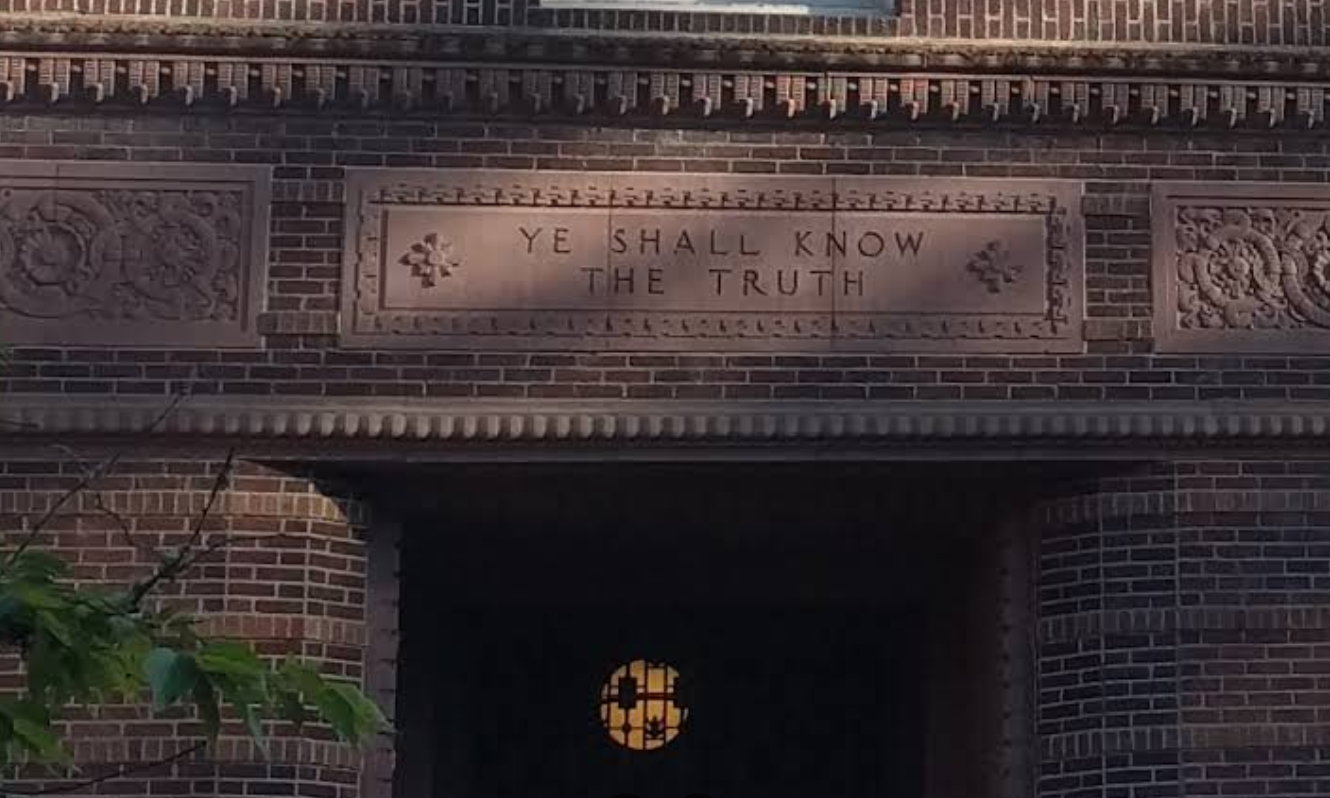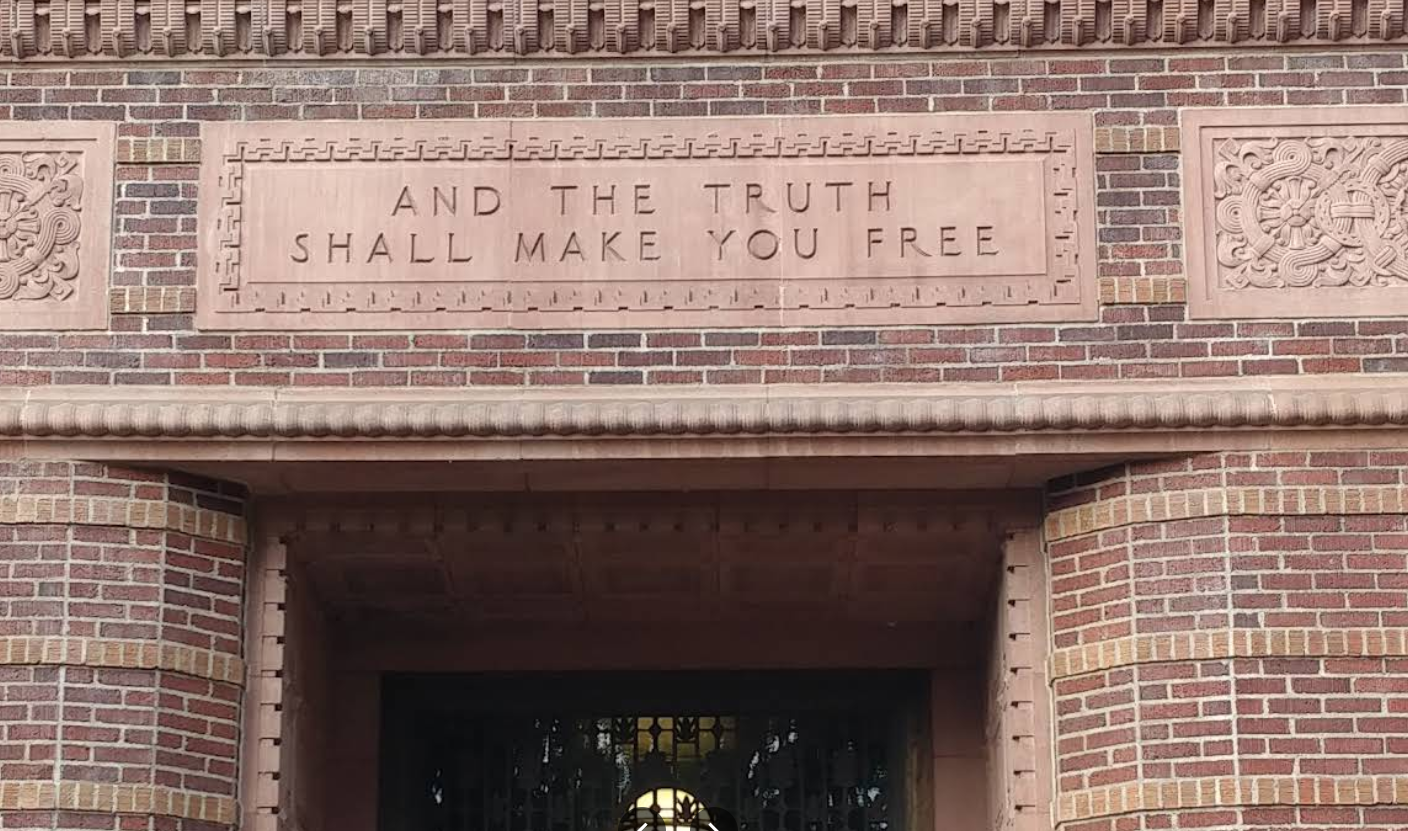Introduction
The oldest fragment (P52 or 𝔓52); possibly less than 20 years after the composition) of the Gospel of the Apostle John (written around 90 AD), contains some words; including the Greek word for truth (ΑΛΗΘΕI[Α], alētheia; ἀλήθεια), of the interrogation of Jesus of Nazareth by Pontius Pilate (John 18:33-38). Within that passage, Jesus was the first one to use the word "truth" (twice), saying: “For this reason I was born, and for this reason I came into the world — to testify to the truth. Everyone who belongs to the truth listens to my voice.” (v. 37b). To which Pilate replies both rhetorically (he didn't really want an answer) and cynically in v.38, “What is Truth?” For Pilate, truth was only a relative term for whatever might help to keep him in his high ranking position; from the use of brutal military force and power to that of making compromises (as he did in this situation; see: Why Did Pontius Pilate...).
All Truth is God's Truth
However, the Apostle John had already explained to his readers what Jesus meant by truth in chapters 8 and 14; which we will examine shortly. But first, have you
ever heard the statement, "All truth is God's truth"? Do you believe that? I do; provided that "truth" here means either
something that is only based upon what is factually and undeniably true in this physical world, or something which God revealed to us in the Scriptures. And both the
physical and spiritual elements of truth will never truly conflict with each other. The first person to have concluded this in writing (and the basis for that saying) appears to be
Augustine, who wrote in his work On Christian Doctrine: “But let every good and true Christian understand that wherever truth may be found, it belongs to his Master.”[1]
We must note that there is a distinction between the words true and truth (apart from true often used as an adjective and
truth as a noun), but some other related terms should also be defined when discussing these:
- True/False - The simplest meaning for this word pair is found in logical and digital "Truth
Tables" where these are often represented by the binary 1 and 0 (zero) bits in digital logic gates. But this paper uses these terms in a much broader sense!
- Fact - A thing that has really occurred or is actually the case; a thing certainly known to be a real occurrence or to represent the truth. Hence: a particular
truth known by actual observation or authentic testimony, as opposed to an inference or a conjecture; a datum of
experience, as distinguished from the conclusions that may be based upon it. Something that should be undeniable. It is a fact that water is a liquid at most temperatures,
but repeatably whenever tested will boil around 212°F (100°C) and freeze around 32°F (0°C); under most conditions. So that which has been proven to be true
by observation.
However, it's also the case that a piece of information may only be allegedly or conceivably true; something presented as a fact but which is disputed or unproven; only an assertion or an allegation. This is why legal court cases with judges and juries exist! And there are many times these days in which so-called facts on social media must be checked and verified. And the phrases, as a matter of fact... or in reality are often used to correct a falsehood. Similar terms would be: An accurate or precise piece of information, a certainty or beyond doubt. - True - Is what we call something that is based upon “facts” that can be verified and/or proven without any reasonable doubt to be
true through evidence and/or demonstration. The word is often used to refer to objective and verifiable statements. Something that is in accordance with fact; agrees with
reality or is correct.
- False - We should also mention that the opposite of something being true is that it is false. And all rational minds would agree to the presupposition
that something cannot be both true and false at the same time! This is called the Law of
of Noncontradiction.
- Truth - When we refer to the truth of something, it is often a conclusive statement based upon a combination of many facts. Rather than truth in general,
it is often used to speak about something quite specific as in: “The truth of the matter is...” So, a truth is most often a true statement or account about
something in particular which is in accordance with fact or reality. But there can also be spiritual truths which cannot be proven by scientific experiments. Thus, the
truth of Scripture which is revealed in its words as being from God, means, for example, that those who claim to be Christians, must conform accurately to all the statements made
therein; or perhaps they do not actually believe it is from God, in which case they may be hypocrites or liars and deceivers.
Are there any times when stating something that is true is not really telling the truth? After a rather long exchange of words between Jesus and some Pharisees, Jesus stated: “You are of your father the devil, and your will is to do your father's desires. He was a murderer from the beginning, and does not stand in the truth, because there is no truth in him. When he lies, he speaks out of his own character, for he is a liar and the father of lies.” (John 8:44; ESV) Note the phrase, "there is no truth in him." Before commenting further, let’s also review some words from Genesis 3:1 ff., where the devil not only sows the seeds of doubt in the mind of Eve, but also states some truthful things in a twisted way in order to prompt Eve and then Adam to sin against God:
- “for God knows that when you eat from it your eyes will open and you will be like divine beings who know good and evil.” (Genesis 3:5; the NET Bible)
And after eating of the fruit, Adam and Eve's eyes were opened so to speak, and they did come to know both good and evil, so technically, the devil was correct in one way in what he'd stated above. But did he "speak the truth" as he'd implied it to them? No! Rather than becoming more divine beings, they woefully learned what it meant to have sinned against God. It seems that the devil had implied and tempted Eve with a knowledge that should have made her more independent; more of a ruler of her own life! Instead, Adam and Eve became slaves to sin in need of the redemption that only God can provide!
So, we must be careful to never use (or, abuse) what is true in an untruthful manner (which, as seen from the above, is exactly what the devil and his followers are often described as doing).[2]
“The Truth shall make you Free”
To put what we discussed above more succinctly: Adam and Eve did suddenly learn something truthful (Genesis 3:7), but it very much did not set them free!! It instead enslaved them to sin which eventually resulted in the death of their bodies! You may have seen the title of this section chiseled into the bricks or stones of a building[3] or printed as a motto by some
organization. But only rarely; for well over a century now, is a reference given as to where those words came from. A wall at the old CIA Headquarters building in the USA was an
exception to that, since it includes “JOHN VIII-XXXII” (John 8-32) after quoting part of the verse.[4] But to pull these words out of
the Bible and the context in which Jesus spoke them is warping, twisting and in many cases just plain lying about their original meaning; which is obviously why almost all
of these do not reference where the words came from.
So what do these words mean? By themselves, they are rather ambiguous: Set you free from what?! Can you be a
slave to ignorance (apart from being manipulated into that state of mind by others)? And what exactly is it that sets you free from anything? Is it just truth in general
or some specific kind of truth? So what is that truth supposed to be from the context of Chapter 8 of the Gospel of John?
The Context of John 8:32
At the time of this writing, among all the inscriptions, mottos and other uses of the words found in John 8:32 throughout the world, there is only
one single instance a search will find that quotes both verses 31 and 32 and references where the words actually came from.[5] Let's look at
the unquoted words from verse 31, showing what the chiseled words mean in context:
- “Then Jesus said to those Judeans who had believed him, "If you continue to follow my teaching, you are really my disciples and you will know the truth, and the truth
will set you free."” (John 8:31-32; NET Bible).
The first thing to notice is that Jesus preceded the words about being “set ... free” with the condition that it applies only to his disciples who actually
“continue to follow my teaching!” But in order to answer the other questions ('What is the truth here?' and 'set free from what?') we must also look at
vv. 33-34:
-
“"We are descendants of Abraham," they replied, "and have never been anyone's slaves! How can you say, ‘You will become free’?" Jesus answered
them, "I tell you the solemn truth, everyone who practices sin is a slave of sin.” (John 8:33-34; NET Bible).
And in verse 36:
“So if the Son sets you free, you will be free indeed.” (John 8:36; ESV).
From the words in the first quote above, one can easily see that it is sin which is what Jesus is speaking about! Not ignorance. And the second quote shows that it's not a what, but rather who will set you free! The truth of verse 32 is how Jesus (compare John 14:6) sets his disciples free from sin![6]
Not only “What... ?” but also “Who... ?”
Truth is actually an attribute of God; not just something He approves of, but a concept embedded within His Being! That God is true or truthful can easily be seen in passages such as Psalm 117:2 (“For His lovingkindness is great toward us, And the truth of the LORD is everlasting. Praise the LORD!”) or John 3:33 (“He who has received His testimony has set his seal to this, that God is true.”). This is why Jesus could say in John Chapter 14: “I am the way, and the truth and the life; no one comes to the Father but through Me.” (John 14:6). The “truth of the LORD” is not simply what can be stated as being true about the LORD, but refers to all the plans He had “before the world was” (John 17:5) and then orchestrated in time, and all the acts which He has done and will do in human history using the lives of certain human beings. I pray that the words above will be helpful in your understanding of God’s Word.
Footnotes
1[Return to Text] The full
quote from Augustine's work (in Book II, Chapter 18) is:
28. But whether the fact is as Varro has related, or is not so, still we ought not to give up music because of the superstition of the heathen, if we can derive anything from it
that is of use for the understanding of Holy Scripture; nor does it follow that we must busy ourselves with their theatrical trumpery because we enter upon an investigation about
harps and other instruments, that may help us to lay hold upon spiritual things. For we ought not to refuse to learn letters because they say that Mercury discovered them;
nor because they have dedicated temples to Justice and Virtue, and prefer to worship in the form of stones things that ought to have their place in the heart, ought we on that
account to forsake justice and virtue. Nay, but let every good and true Christian understand that wherever truth may be found, it belongs to his Master; and
while he recognizes and acknowledges the truth, even in their religious literature, let him reject the figments of superstition, and let him grieve over and avoid men who,
"when they knew God, glorified him not as God, neither were thankful; but became vain in their imaginations, and their foolish heart was darkened. Professing themselves to
be wise, they became fools, and changed the glory of the incorruptible God into an image made like to corruptible man, and to birds, and four-footed beasts, and creeping
things." (On Christian Doctrine, Chapter 18)
That last part of the quote being from Romans 1:21-23. And for those of you who wish to see the original Latin, you can find that here: Augustinus, De Doctrina Christiana, after clicking on "Liber II," search
for "18. 28. Sed sive ita" etc.
2[Return to Text] Legally,
in the courts of most English speaking countries, the sworn testimony of witnesses includes the words
“the truth, the whole truth, and nothing but the truth.” The meaning of those words are as follows:
The truth: Requires that the witness be honest and not lie;
they must not deliberately deceive the court.
The whole truth: Emphasizes that the testimony must be complete and comprehensive. A witness cannot omit crucial facts,
even if those facts are unfavorable to their side, as this could be considered a form of deception.
And nothing but the truth: The witness must not include
anything that is not true, including lies, opinions, or irrelevant statements. It reinforces the idea
of sticking strictly to the facts of the case.
And the most effective way to achieve those requirements is to be able to convict a witness of the crime of perjury if they are later found to have lied to the court. It should be quite obvious that the devil and all of
those who lie just like him could never pass this oath!
Here's another example from Scripture of how truth can be abused. Matthew 22:16 contains the sentence: “Teacher, we know that You are truthful and teach the way of God in truth, and defer to no one; for You are not partial to any.” But if you
read this passage in its context, you'll soon discover, even though that is a true statement concerning Jesus’ character, it was made by disciples of the Pharisees who
sought to kill Him! Beginning at verse 15, we read:
15 Then the Pharisees went and plotted together how they might trap Him in what He said. 16 And they sent their disciples to Him, along with the
Herodians, saying, "Teacher, we know that You are truthful and teach the way of God in truth, and defer to no one; for You are not partial to any. 17 Tell us then,
what do You think? Is it lawful to give a poll-tax to Caesar, or not?" 18 But Jesus perceived their malice, and said, "Why are you testing Me, you hypocrites?
19 Show Me the coin used for the poll-tax." And they brought Him a denarius. 20 And He said to them, "Whose likeness and inscription is
this?" 21 They said to Him, "Caesar's." Then He said to them, "Then render to Caesar the things that are Caesar's; and to God the things that are
God's." 22 And hearing this, they were amazed, and leaving Him, they went away. [Matthew 22:15-22; NASB]
Although it's highly likely those disciples of the Pharisees considered their words to be merely a ploy to catch Jesus off guard, nevertheless, they're proof
that evil men can still speak words which are true (say something that is truthful); even when they do so only to serve their own twisted sense of purpose.
[Return to Text]
3[Return to Text] The Knight Library at the University of Oregon has two different parts of this passage chiseled into the stones
above its east and west entrances (both of them being on the north side of the building):
Here's another example from an administration building; labeled "(MAI)" on maps of the University of Texas at Austin:
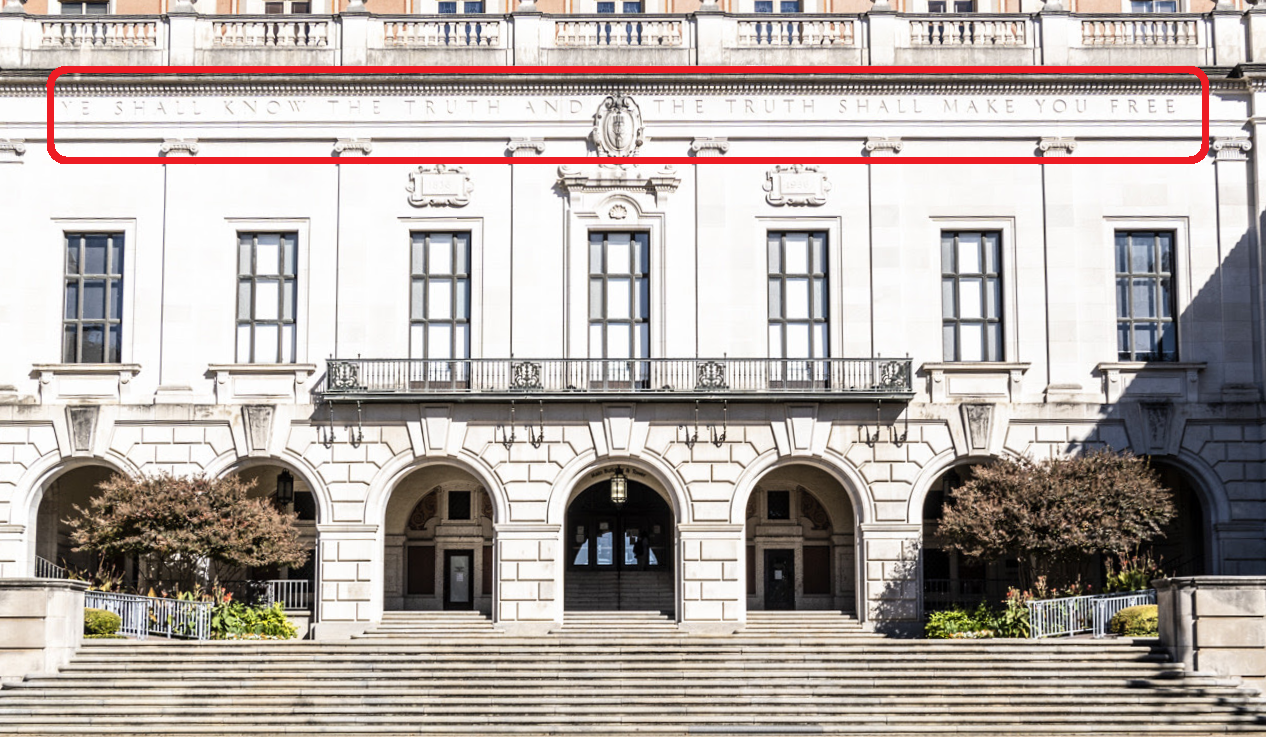
The words can also be found above the second floor windows (above
the RED line in the photo below)
at the entrance on the east side (969 Morrill Rd.) of the Parks Library at Iowa State University:
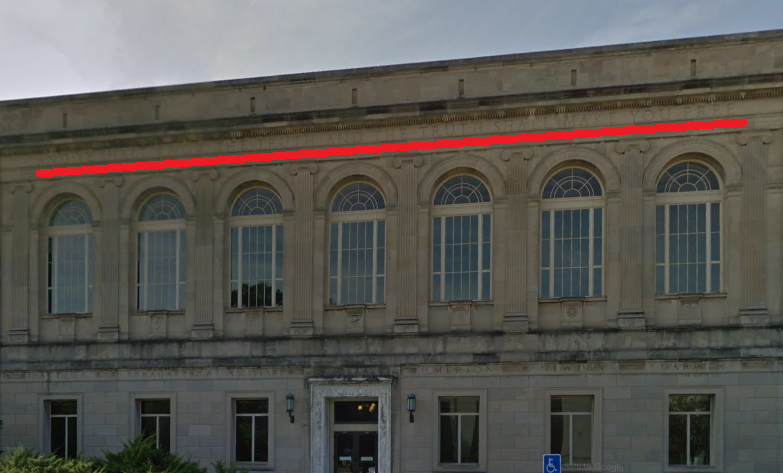
This verse has also been used as or in school and organization mottos
(for example, the motto of the Lenoir—Rhyne University is: “ἡ ἀλήθεια ἐλευθερώσει ὑμᾶς”; or
literally: "The truth will set free you all" and is identical to the Greek Text of second phrase of John 8:32). Other examples can be found at The truth will set you free. [Return to Text]
4[Return to Text]
See this Official CIA Page for more about the quote and a picture of the wall. Here's
one I have from long ago; but the "JOHN VIII-XXXII" isn't visible in this picture: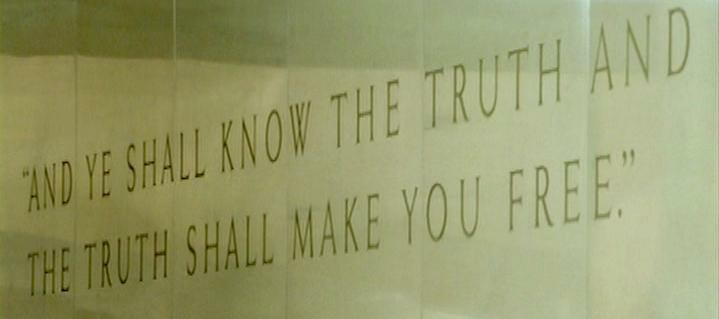
5[Return to Text] In spite
of the fact that the latest version of the Constitution the Dominican Republic (see
Article 32 on page 10 of 101) references only verse 32 of John 8 ("Lleva en el centro la Biblia abierta en el Evangelio de San Juan, capitulo 8, versiculo 32,"
or in English: In the center it has the Bible open to the Gospel of Saint John, chapter 8, verse 32), the full contextual reference (including all of verse 31) appears on
both the official Coat of Arms of the Dominican Republic and the Flag of the Dominican Republic. The following is an enlarged image from the center of the
Coat of Arms and also just the words after rotating them: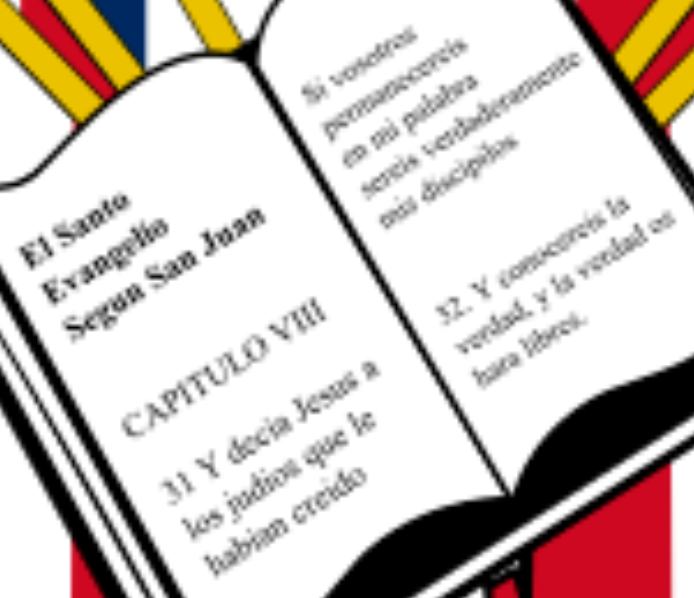
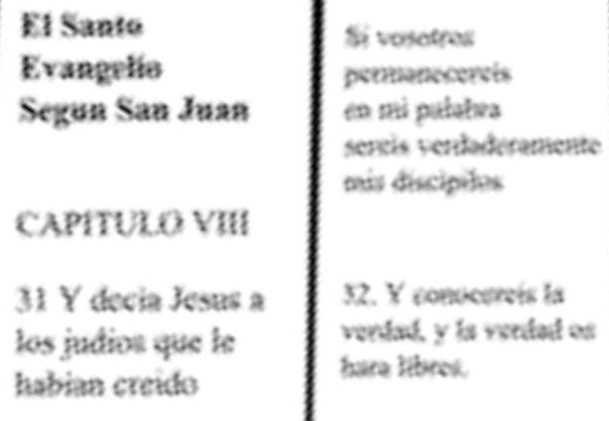
Anyone who reads Spanish could easily make out these words, but for clarity, they are: “El Santo Evangelio Segun
San Juan / CAPITULO VIII / 31 Y decia Jesus a los judios que le habian creido / Si vosotros permaneciereis en mi palabra sereis verdaderamente mis discipulos / 32. Y
conocereis la verdad, y la verdad os hara libres.” (Which is basically in English: The Holy Gospel According to Saint John / Chapter VIII / And Jesus said to the Jews
who had believed him / If you continue in my word you will truly be my disciples / 32. And you will know the truth, and the truth will set you free.) This is almost the same as
the 1909 version of the Reina-Valera translation (La Santa Biblia Reina-Valera);
minus all diacritical marks and punctuation, except for the fact that the last two words here
are hara libres whereas the 1909 Reina-Valera has only libertará at the end. [Return to Text]
6[Return to Text] Decades
ago, while working at my first long term job (XYtron, Inc.), I wrote out the following for my co-workers; which explained what John 8:32 was all about:
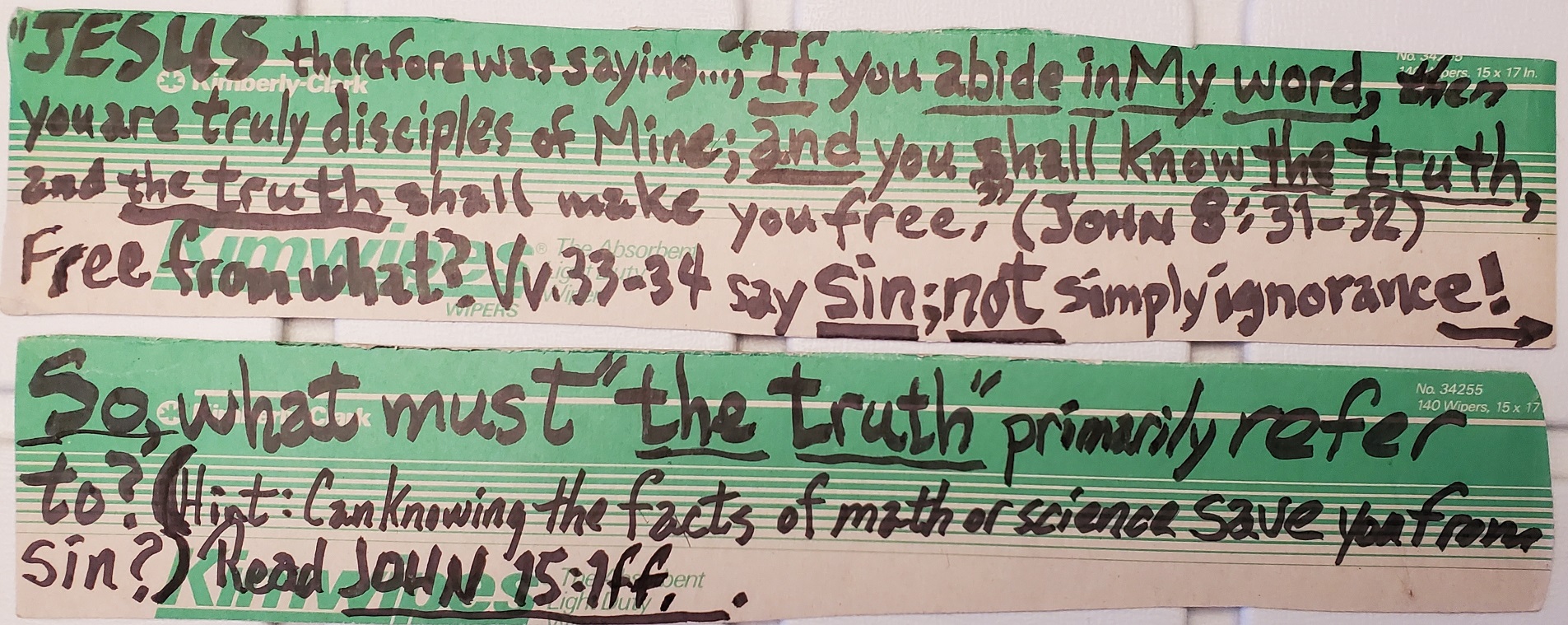
First Posted on: 21 OCT 2025 (2025.10.21).
You can write to me here: contact page (opens in a new window).
